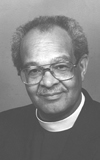Leadership Gallery
The Reverend Dr. John Carleton Hayden, 1933-2022
Born in Bowling Green, Kentucky in 1933, John Carleton Hayden has been active in Church education, leadership, and social issues. Following his ordination into the diaconate in 1963, Hayden went to Canada to serve as the honorary assistant at St. James in Regina and as the chaplain of the University of Regina. He transferred back to the United States in 1971 to serve at various parishes in Washington, DC and Maryland. Beyond parish ministry, much of his work has been devoted to documenting the history of African Americans in the Church and advocating for equality, respect, and fair treatment.
Throughout the 1970s, Hayden was involved with African American and social issues. He served on the board of the National Council of Churches and the Union of Black Episcopalians. While with the Diocese of Washington, he worked on the Interracial Task Force and the Community Action and Human Development Commission. He also served on the Diocese of Maryland’s Commission for Black Ministry.
Hayden’s most notable contributions to the Church and society came as an educator and historian. Between 1971 and 1987, Hayden was the Assistant Professor of History at Howard University in Washington, DC and the Adjunct Professor of Church History at the Virginia Theological Seminary. He later went to the University of the South in Sewanee, Tennessee to become their associate dean at the School of Theology. In the 1990s, he was an advisor at St. Andrew's-Sewanee School.
As a historian and author, Hayden has written prolifically on African American Church history and social issues. His books include Struggle, Strife and Salvation: Role of Blacks in the Episcopal Church and Afro-American Clergy Confront the Twentieth Century. His many articles include “New Men, Strange Faces, Other Minds: The Human Rights Revolution, 1954-1978", “Conversion and Control: Dilemma of Episcopalians in Providing for the Religious Instruction of Slaves, Charleston, South Carolina, 1845-1860", and “After the War: The Mission and Growth of the Episcopal Church Among Blacks in the South, 1865-1877". [Sources]


